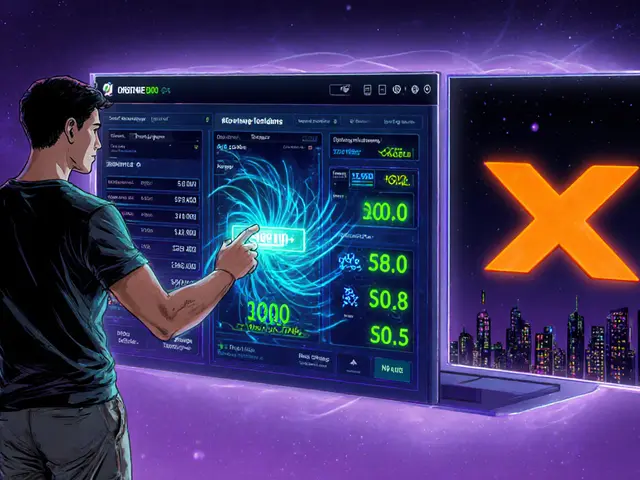Crypto Exchange VPN Detection Simulator
Key Takeaways
- Most exchanges spot VPN traffic using IP reputation lists, behavior analysis, and device fingerprints.
- Premium services like NordVPN and ExpressVPN lower the odds, but detection still happens for rapid location changes.
- Regulatory rules (KYC/AML) push exchanges to tighten VPN checks, especially on large platforms.
- Combining a dedicated IP, stable server location, and careful login timing can keep you under the radar.
- Even with a VPN detection crypto exchange strategy, security benefits outweigh occasional access hiccups.
If you’ve ever tried to log into Binance, Coinbase, or a smaller DeFi hub while a VPN badge flashes on your screen, you know the frustration. The crypto world loves privacy, but exchanges are under a regulator’s microscope and they’ve gotten pretty good at sniffing out masked traffic. Let’s break down how they work, what the numbers really look like, and what you can do to stay trading without constantly hitting verification walls.
VPN is a virtual private network that encrypts your internet connection and hides your real IP address. By routing traffic through a remote server, a VPN can make it appear as if you’re browsing from another city-or another continent.
Crypto exchange is an online platform where you can buy, sell, or trade digital assets like Bitcoin and Ethereum. These platforms need to know who you are and where you’re connecting from to satisfy anti‑money‑laundering (AML) and know‑your‑customer (KYC) rules.
Why Exchanges Hunt for VPNs
Regulators in the US, EU, and Asia demand that exchanges keep tight tabs on user locations. If a platform can’t prove where a trader is based, it risks heavy fines or losing its license. That pressure translates into sophisticated detection pipelines that flag anonymizing tools.
How Detection Systems Spot VPN Traffic
Modern detection system is software that analyzes login patterns, IP metadata, and device fingerprints to decide whether a connection is trusted. The main techniques include:
- IP reputation databases: Services maintain lists of known VPN IP ranges, especially those from free providers. When you connect, the exchange checks the address against the list.
- Behavioral analysis: If your account jumps from Tokyo to London within minutes, the algorithm flags it as "geolocation inconsistency".
- DNS leak detection and WebRTC fingerprinting: Even if the VPN hides your IP, a stray DNS request or a WebRTC leak can reveal the true origin.
- Machine‑learning models: They inspect timing, packet size, and other subtle cues to differentiate a human user from an automated bot using a VPN.
The combination of these vectors means that a simple, free VPN has a high chance of being caught-studies from PureVPN’s 2025 report suggest detection rates in the 70‑80% range for low‑quality services.
Premium VPNs That Trade Better on Exchanges
Not all VPNs are created equal. Providers targeting crypto traders have added features that slip under many detection radars.
NordVPN is a premium VPN offering dedicated IPs, RAM‑only servers, and cryptocurrency payment options. Its dedicated IPs sit on residential‑like ranges, which are rarely flagged by IP reputation lists.
ExpressVPN is another top‑tier service that runs from the British Virgin Islands and accepts Bitcoin for payment. It boasts over 3,000 servers in 94 countries and uses obfuscation protocols designed to hide the fact that it’s a VPN.
Both services cost more than a typical “free‑tier” VPN, but the extra expense buys you a lower detection probability and added security against phishing and malware.
| Feature | NordVPN | ExpressVPN |
|---|---|---|
| Dedicated IPs | Yes (extra fee) | No (shared residential IPs) |
| Crypto Payments | Bitcoin, ETH, USDT, LTC | Bitcoin only |
| Server Count | 5,500+ in 118 countries | 3,000+ in 94 countries |
| No‑logs jurisdiction | Panama | British Virgin Islands |
| Obfuscation protocols | Obfsproxy, NordLynx | Lightway, Stealth VPN |

Balancing Privacy with Regulatory Compliance
Even if you hide your IP, exchanges still need to verify your identity. Most platforms implement a tiered approach:
- Standard accounts: Full trading, but occasional VPN flag leads to extra identity verification.
- Verified accounts: Once KYC is done, some exchanges relax location checks, though they may still limit withdrawals from VPN‑detected IPs.
KYC is a process that collects personal identification data to confirm a user’s real‑world identity, while AML is regulations designed to prevent money laundering and terrorist financing. These rules force exchanges to keep a clear audit trail, which is why they push hard on geolocation data.
Practical Tips to Reduce VPN Detection
- Stick to one server location per day. Jumping continents triggers behavioral alerts.
- Use a dedicated IP. Residential‑type IPs blend in with normal traffic.
- Enable DNS leak protection. Most premium VPN apps have a single toggle.
- Match your device’s timezone. If your OS shows a UTC‑2 zone while the IP says “New York,” you’ll raise eyebrows.
- Consider a residential proxy for high‑frequency trading. They are pricier but far less likely to be on IP reputation lists.
These steps aren’t foolproof, but they shrink the detection window from “almost certain” to “maybe”.
What the Numbers Really Mean
Chainalysis’ 2025 Global Crypto Adoption Index notes that VPN traffic makes up a noticeable slice of overall activity, but it’s still a minority-roughly 5‑10% of total login attempts on major exchanges. That means the 70‑80% detection claim likely applies to low‑cost VPNs, not premium services. Larger platforms like Binance and Coinbase have the resources to run machine‑learning models that flag suspicious patterns with higher accuracy, while smaller or decentralized exchanges may miss many VPN users altogether.
Future Outlook: The Arms Race Continues
As regulators tighten rules, detection systems will keep improving-think deeper packet inspection and AI‑driven heuristics. At the same time, VPN providers are already rolling out next‑gen obfuscation methods, such as “stealth” protocols that mimic regular HTTPS traffic. The balance will stay dynamic, and traders should treat VPN usage as one layer of a broader security strategy, not a silver bullet.
Frequently Asked Questions
Do all crypto exchanges block VPNs?
No. Major regulated exchanges often flag or limit VPN traffic, while many smaller or decentralized platforms have little to no detection at all.
Is a dedicated IP enough to avoid detection?
It dramatically lowers the odds, but rapid location changes or other behavioral cues can still trigger alerts.
Can I use a free VPN safely for crypto trading?
Free VPNs share IPs in data‑center ranges that are heavily flagged. Expect frequent account locks or withdrawal limits.
What extra security does a premium VPN provide beyond IP masking?
Features like DNS leak protection, malware blocking, dark‑web credential monitoring, and obfuscation protocols protect you from phishing and credential theft, which are common attack vectors in the crypto space.
If I’m flagged, how do I get my account back?
Usually you’ll need to complete a KYC verification step, provide a selfie with ID, and sometimes answer a brief questionnaire about recent login locations.




scott bell
September 13 2025Picture this you’re on a hot trade and the exchange throws a VPN flag at you like a sudden hailstorm. The system sees a data‑center IP and instantly doubts your location. Free VPNs often sit on those shared pools that look suspicious. If you hop servers every few hours the alarms go off faster than a siren. Staying on one dedicated IP for a day can keep the radar quiet. It’s a simple habit that saves a lot of headache.
vincent gaytano
September 17 2025Sure the regulators “just want” to protect users, but maybe they’re also hunting anyone who dares hide behind a cheap VPN. Every time you switch continents the algorithm smiles and flags you – like it has a personal vendetta. It’s almost as if the exchanges have a secret blacklist sourced from the shadows of the internet. All that “machine‑learning” is probably just a glorified rule‑engine that watches for patterns the way a paranoid neighbor watches the street. Of course you’ll get the dreaded verification dance.
Jeannie Conforti
September 22 2025if u want to lower the chance of getting flagged try using a dedicated ip and dont bounce around too much it really helps alot
tim nelson
September 27 2025i get how annoying it feels when the exchange asks for extra verification after a VPN alert. sticking to one server per day and enabling dns leak protection usually smooths things out. also make sure your device timezone matches the ip location, that tiny detail can stop a lot of false flags.
Zack Mast
October 1 2025the truth is that many free vpn services are just tools of the globalist elite to monitor us. they dump our traffic into shared data centers that any watchdog can sniff. you think a premium service is safe? only if you pay the price they want you to. the system rewards those who can afford the “dedicated” label while the rest get caught in the net.
Dale Breithaupt
October 6 2025use a residential proxy if you trade heavy. keep your login times consistent. enable dns leak protection. match timezone. that’s it.
Rasean Bryant
October 10 2025Good luck staying under the radar!
Angie Food
October 15 2025this whole vpn detection spiel is just hype i bet 90% of users never even notice a flag they just keep trading like nothing.
Jonathan Tsilimos
October 20 2025From a compliance architecture perspective, the integration of IP reputation services with behavioral analytics constitutes a layered defense mechanism that substantially mitigates the risk vector associated with anonymizing networks.
jeffrey najar
October 24 2025When you connect to a crypto exchange through a VPN, the first thing the platform checks is the reputation of the IP address you present.
Free VPN providers often allocate data‑center IP blocks that appear on most blacklists used by compliance teams.
Because those blocks are shared among thousands of users, any single suspicious login can trigger a flag for the entire range.
Premium services mitigate this by offering dedicated or residential IPs that behave like ordinary home connections.
A dedicated IP isolates your traffic, so the exchange sees a consistent source rather than a noisy pool.
However, even with a dedicated IP, the exchange still monitors login patterns such as rapid geographic jumps.
If you log in from New York one hour and then from Tokyo the next, the system interprets that as a possible credential compromise.
Enabling DNS leak protection ensures that no stray DNS queries reveal your true location behind the VPN tunnel.
Matching your device’s timezone to the VPN server’s location removes another simple heuristic that many platforms use.
Using a consistent server for the entire day reduces the number of anomalies the algorithm has to evaluate.
Some traders also layer a residential proxy on top of their VPN to further blend into normal traffic.
This approach can drop the detection probability from the advertised 70‑80 % for free services down to the low‑20 % range for meticulous setups.
Keep in mind that exchanges continuously update their detection models, so what works today may need adjustment tomorrow.
Regularly reviewing your VPN provider’s IP rotation schedule and opting out of automatic rotations can help you maintain a stable footprint.
Ultimately, combining a reputable premium VPN, a dedicated IP, and disciplined login behavior creates a robust shield against most automated flagging systems.
Rochelle Gamauf
October 29 2025While the author presents a comprehensive overview, the analysis fails to address the inherent trade‑off between privacy and regulatory compliance, thereby undermining its practical usefulness for seasoned traders.
Jerry Cassandro
November 2 2025actually the point about matching timezone is often overlooked – make sure your OS clock follows the VPN server location and you’ll avoid that extra verification step that many people complain about.
Parker DeWitt
November 7 2025🚀 love the idea of beating the system but remember the exchanges are playing 3‑D chess – even the best stealth VPN can get caught if you’re too aggressive with your moves 😅 keep it chill and the flags will stay low.
Allie Smith
November 12 2025i think the whole vpn story is just a reminder that tech evolves faster than rules – stay curious, keep learning and you’ll always find a way to trade safely.
Lexie Ludens
November 16 2025the vpn detection narrative is overblown – it’s like screaming about a mosquito bite while the real problem is a looming market crash that everyone’s ignoring.
Aaron Casey
November 21 2025From a network security standpoint, employing a split‑tunnel configuration can reduce exposure by routing only exchange traffic through the VPN while keeping other services on the native ISP, thereby minimizing fingerprinting vectors.
Leah Whitney
November 26 2025if you’re new to this, start with a single reliable vpn provider, set up a dedicated ip, and test your login consistency before adding more complexity – simple steps build confidence.
Lisa Stark
November 30 2025the cat‑and‑mouse game between exchanges and privacy tools reflects a deeper tension in the digital age: the desire for anonymity versus the need for accountability, a balance each user must navigate personally.
Logan Cates
December 5 2025people love to fear the regulators but most of the time the “detection” alerts are just automated noise – don’t let it stop you from using the tools that work for you.